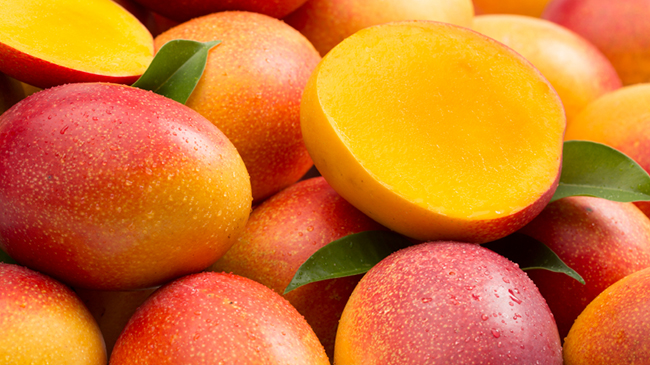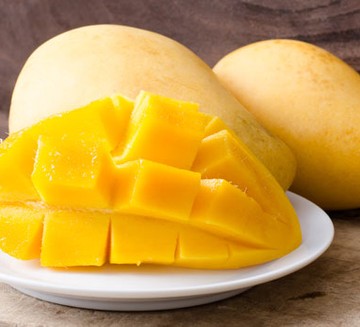Mangoes are tropical stone fruits, plump and oval in shape and about the size of a grapefruit. They have an inedible skin that ranges in colour from yellow to green through to red-green, depending on the variety, whilst inside is a soft, edible yellow flesh and a hard inedible stone.
Mangoes only grow in warmer climates. They are native to Southern Asia, but they are now grown in other countries including the US, Mexico and the Caribbean.
This tropical fruit is refreshing, juicy and delicious, and like most fruit, it has some great nutritional benefits. Read on to discover why mango is so good for you and whether fresh or dried is best.
High in fibre, vitamins and minerals, eating mango has many benefits. Discover how much counts towards your 5-a-day and whether fresh or dried is best.
Nutritional benefits of mango
Mango is a low-calorie fruit that is high in fibre ,and is a great source of vitamins A and C. It also contains folate, B6, iron and a little calcium, zinc and vitamin E. Mangoes are a good source of antioxidants, containing certain phytochemicals such as gallotannins and mangiferin which have been studied for their health benefits.
Just 80g of mango (2 x 2 inch slices) counts as one of your five-a-day. This one portion will provide 53 calories, 11g of naturally-occurring sugar and just over 2g of fibre.
Mango can help for healthy skin and hair
Mangoes contain good levels of both vitamins A and C.
Vitamin C is involved in the formation of collagen – the protein that provides the skin’s elasticity. Vitamin C is one of the most important antioxidants, playing a protective role against environmental damage; a deficiency of vitamin C can affect wound healing and increase fine lines and wrinkles. Our hair also requires vitamin C both for collagen production and also to help with the absorption of iron – an important mineral needed for hair growth.
All cells require vitamin A for growth, including the skin and hair – and some studies suggest that it may offer potential protective effects against the signs of ageing. One of vitamin A’s key roles in hair and skin health is its involvement in the production of sebum, the oily substance that moisturises both our skin and scalp.
For centuries, these tropical tree fruits have been enjoyed for their sweet, bright flavor. More recently, research has uncovered added benefits in the form of key nutrients that help people fight disease, maintain a healthy weight, and even ward off some signs of aging.
Like peaches and cherries, mangoes are known as a stone fruit because of their center pit, which is easily recognizable because of its large size and flattened oval shape.
Health Benefits
The vitamins, minerals, and antioxidants in mangos can provide important health benefits. For example, vitaminK helps your blood clot effectively and helps prevent anemia. It also plays an important role in helping strengthen your bones.
Mangos are also helpful for supporting your cardiovascular system. They are a great source of magnesium and potassium, both of which are connected to lowerblood pressure and a regular pulse. Furthermore, mangos are the source of a compound known as mangiferin, which early studies suggest may be able to reduce inflammation of the heart. Mangos are also rich in vitamin C, which is important for forming blood vessels and healthy collagen, as well as helping you heal.
In addition, mangos can provide other health benefits like:
Lower Risk of cancer
Mangos are rich in beta–carotene, a pigment responsible for the yellow-orange color of the fruit. Beta-carotene is an antioxidant, just one of many found in mangos. The antioxidants in mangos have been shown to fight free radicals, which can cause damage to your cells and potentially lead to cancer.
Digestive health
Mangos can help stabilize your digestive system. They offer both amylase compounds and dietary fiber, which can help you avoid constipation. Amylase compounds can help dissolve other foods in your stomach, breaking down difficult starches. Meanwhile, the fiber in mangos can be more effective for relieving constipation than equivalent fiber supplements.

